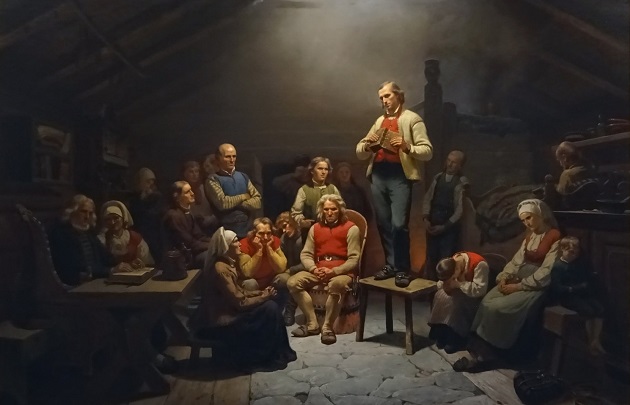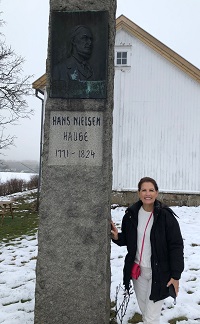H. N. Hauge: An early Norwegian entrepreneur evangelist revered from Oslo to Minnesota
So-called haugeans established churches in the New world as more and more Norwegians chose to cross the Atlantic throughout the 19th and 20th century.
28 JUNE 2019 · 13:00 CET

This story was originally published by Religion Unplugged. It was re-published with permission of the author.
FACTS
Hans Nielsen Hauge
Born: April 3; Died: March 29, 1824
Norwegian itinerant preacher, author, reformer and entrepreneur
Was put in prison for over 8 years
Considered a pioneer for the Christian lay-movement in Norway
Subject to renewed interest as a leader and innovator
----------------------------
A former presidential contender in the US is among those who are deeply fascinated by Hans Nielsen Hauge (1771-1824), the man who has been called the first modern Norwegian citizen. We will get back to that. But first:
Hauge School of Management (HSM) is situated in the heart of Oslo, the capital of Norway. It was started in 2013. It only takes five minutes to walk to the Royal castle and 10 minutes to the national parliament, Stortinget.
ETHICAL SHORTCOMINGS
The initiative to this school came from professor Magne Supphellen of the Norwegian School of Economics in Bergen, one of Europe´s leadling business schools. “I was frustrated over the shortcomings in the teaching on ethical perspectives in higher education,” Supphellen says.
His passion was to develop the character of students, not just to give them theoretical guidelines and principles. ”I want students to think through what their purpose is and have higher ambitions than just filling their own wallets,” Supphellen explains. In this regard, he thinks Hans Nielsen Hauge is interesting as an example. “He is unique in Norwegian history. He was very clear on his vision and had tremendous success.”
Supphellen adds that research on calling, faith and values has grown enormously over the last decade. “Modern research on leadership includes aspects which were central to Hauge,” he says.
Supphellen underscores that Hauge in no ways was perfect. “He didn´t take good enough care of his health, slept too little and occasionaly made decisions which, while perhaps good for his movement, were not necessarily good for his followers, on a personal level.”
RELEVANT VALUES
Still, the professor thinks that Hauge put important principles into practice which are good and relevant even today. “He based his businesses on trust, employee influence, hard work and vocation,” he said.
Supphellen has done research among poor people in the slums outside Nairobi in Kenya. He discovered that persons with an approach similar to that of Hauge, have more success than those who believe that their life is ordained by fate or those who think God will reward you with success if you sacrifice enough resources to the church, what he calls “prosperity gospel logic.”
One of the Hauge students in Oslo, Madelen Nordhagen (22), chose to study there because this education gave an opportunity to combine innovation and leadership.
“The study program is characterized by an emphasis on business ethics, but also a focus on personal identity,” she explains.
Her fellow student Eirik N. Lunde believes inspiration from Hauge can be even more valuable in the future when Norway will rely less on income from oil exports. Creative entrepreneurship will be crucial. “I also think he has something important to tell Christians about having a whole life-approach. It easily happens that we separate our life in church and at work, but Hauge was able to integrate these sides of life,” Lunde says.
The Hauge School is part of the private Christian NLA University College, with campuses in three Norwegian cities and a broad selection of study programs, owned by seven Christian organizations. All of these organizations can - to a larger or smaller extent - trace their roots back to Hauge, even if they were established decades after his death.
CHALLENGED AUTHORITIES
In his own time, Hauge in fact had to challenge established structures and pave the way for religious and individual freedom. Despite heavy opposition from church leaders and government, Hauge managed to create a movement which became a strong cultural force for generations. He traveled around large parts of the country on foot, often knitting simultaneously to use his time well. In his day, it was illegal for laypersons to preach in Norway, which was in a union with Denmark at the time. Permission for Christian gatherings other than services in the official Church of Norway, would have to be supervised by the local parish minister.
Hauge himself was in no way an academic. He was the son of an ordinary farmer. Throughout his life, he was inspired by the event on the 5th of April 1796. While working in the field in Tune, around 100 miles southeast from Oslo, he experienced an unexpected encounter with God and was intensely filled by the Holy Spirit, he later explained. Immediately, he started traveling around the country to preach the Gospel. The result was a movement all over the country. In order to finance the movement and find work for the poor, he started businesses, like mills and printing presses. Prior to this, he had received strong impulses from German pietism, which was influential in these days and had a strong impact on the Nordic countries.
PUT IN PRISON
His initial activities lasted for eight years. Throughout that period he was arrested several times, but usually released after a few days. The Bishop of Kristiansand, Peder Hansen, were among several officials who filed complaints about Hauge to the King of Denmark and Norway. The bishop even compared Hauge to the founder of Wahabism, Muhammed ibn Abd al-Wahab. Today Wahabism is known as the Islamistic ideology in Saudi Arabia.
The Government in Copenhagen asked Norwegian officials to report on Hauge´s activities. In these reports he was accused of being a demagogue who disseminated superstition, undermined the trust in the authorities and enriched himself. An arrest order was issued, but at this time he was already arrested again for illegal preaching. He was put behind bars and not released before 1814, the year the union between Norway and Denmark was dissolved. His health was broken down, but after this he lived as a respected man until he died nine years later.
BESTSELLING AUTHOR
Among his accomplishments in his active years was to write and publish literature at an incredible rate. It has been estimated that his books sold over 200,000 copies - in a population of less than 1 million.
But even if it is hard to overstate his influence, many Norwegians know little about him. Part of the explanation can be that devout Christians have made him exclusively their own, according to the Hauge biographer Dag Kullerud. “He became a jewel for the inner mission,” Kullerud says with reference to one of the revival movements which arose in the wake of Hauge´s life. Kullerud thinks this has resulted in an underestimation of the power of reform, uproar and new initiatives for which Hauge was responsible. “A good example is his view of women and willingness to give them positions,” Kullerud says.
Hauge did not only preach a radical message about sin, repentance and grace, where he especially and very explicitly challenged the ministers in the state church. He also challenged the social status quo in a traditional and authoritarian society. “Initially it was a religious rebellion, but it also became a relieving power for the people of Norway,” Kullerud says.
After his biography was published in 1996, Kullerud´s impression is that the interest around Hauge and his life has grown including outside Christian communities, where he for two centuries has been a figurehead.
EXPORTED TO AMERICA
Followers of Hans Nielsen Hauge were among the first emigrants from Norway to the US. So-called “haugeans” established churches in the New world as more and more Norwegians chose to cross the Atlantic throughout the 19th and 20th century.
“Hans Nielsen Hauge is of immense importance for Norwegian church life and to some extent for Scandinavian and Scandinavian-American church life,” Vidar L. Haanes writes in an email. He is professor of church history and rector of MF - Norwegian school of Theology in Oslo.
“Hauge paved the way for the peasant class to fill political positions in the young Norwegian democracy, with several members in the very first Norwegian parliament of 1814. So already in the 1830’s the general impression of Hauge and his work was much more positive, and his reputation grew especially between 1850 and 1900,” Haanes continues. “After that Hauge has been seen as a founding, spiritual father of the ever-stronger Norwegian lay movement, with several religious “low church” organizations (NGO’s) working with foreign and inner mission, diaconal work, building schools and hospitals in Norway and in an increasing number of mission fields. We did even get Hauge synods and colleges in America.”
THANKFUL CONGRESSWOMAN
One of the estimated 4.5 million Americans today who have Norwegian roots, is Michele Bachmann. The former member of the US Congress from Minnesota was a contender for the Republican nomination in the 2012 presidential election. This spring she visited Norway to speak at the Christian political conference Oslo Symposium. But she also wanted to use the opportunity to learn more about Hauge. “I am eternally thankful for the heritage from Hans Nielsen Hauge,” she said in her talk at the conference.

She underlined that in her mind this was not a question about him, but about him being used by God. Bachmann visited Hauge´s childhood home while she was in Norway. She also said she is very interested in learning more about him and his life.
NO TRADITIONALIST
Senior lecturer Linda Helén Haukland at Nord University has done research on the influence on Hauge and his followers. She points especially to his efforts to promote reading and book publishing. “There is a need to get rid of the traditional tale about him, because there was not much traditional about him,” Haukland writes in an email.
She points to his radical ideas about equality in dignity. “Today, the dimension of faith is often seen as an obstacle to social development. The understanding of faith as liberating for the democratic competence of individuals can prevent us from becoming religiously blind, both in our understanding of ourselves in light of the past, and when we are to make decisions about what kind of society we want in the future,” Haukland states.
STILL AN INSPIRATION
Even up to this day, several initiatives in Norway have been started in Hauge´s spirit or his name in Norway. This has happened in the spectrum from microcredit in poor African countries to businesses and schools. Almost 200 years after Hauge´s death, we have probably not seen the last fruits of his life.
Tore Hjalmar Sævik is a journalist at Dagen in Norway.
Published in: Evangelical Focus - Features - H. N. Hauge: An early Norwegian entrepreneur evangelist revered from Oslo to Minnesota
